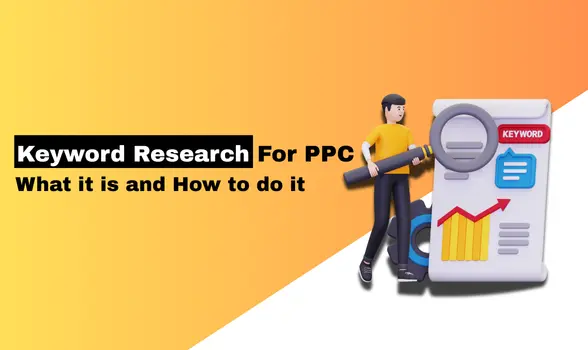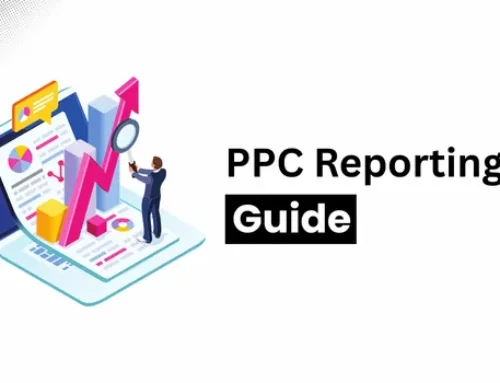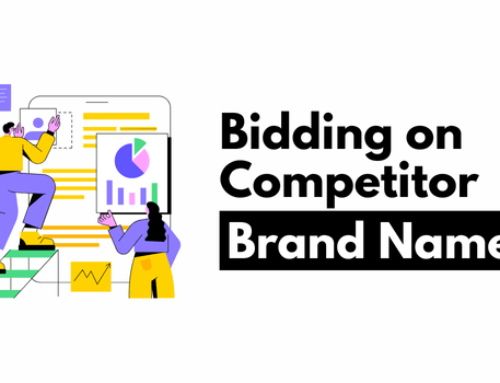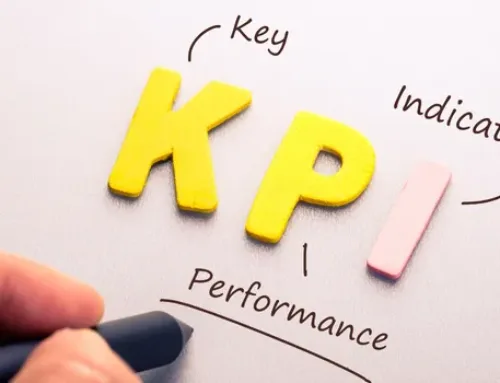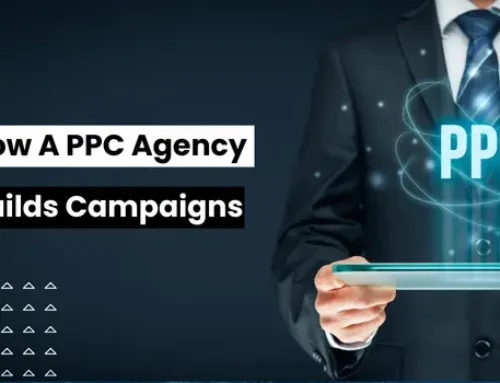If you’ve ever run paid ads and wondered why some campaigns take off while others flop, the answer often lies in one thing: PPC Keyword Research.
In this guide, we’ll break down what PPC Keyword Research is, why it matters, which tools to use, and practical tips to make your PPC Services more profitable.
What is PPC Keyword Research?
Simply put, PPC Keyword Research is the process of finding and selecting the right words or phrases that your potential customers are typing into search engines. This process helps you target your ads to appear for the most relevant queries.
But why do we do it?
Because the right keywords ensure your ads are seen by the right audience, which directly impacts your ad relevance, click-through rates, and conversions.
What are the different types of keywords in PPC?
- Broad Match Keywords: Show ads for searches that include any word in your keyword phrase, in any order.
- Phrase Match Keywords: Show ads for searches that include your exact phrase, plus possibly other words before or after.
- Exact Match Keywords: Show ads only for searches that match your keyword exactly.
- Negative Keywords: Exclude searches that aren’t relevant to your offer.
- Long-Tail Keywords: Longer, more specific phrases with lower competition but often higher conversion rates.
What are the different types of search intent in PPC?
Search intent is all about why someone is searching. Understanding this can make or break your PPC Keyword Research.
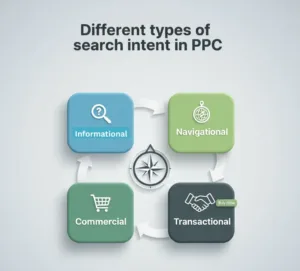
- Informational – Users want to learn something (“how to train a puppy”).
- Navigational – Users are looking for a specific website or brand (“Nike store near me”).
- Commercial – Users are comparing options (“best laptops for gaming 2025”).
- Transactional – Users are ready to buy (“buy iPhone 15 online”).
Why does PPC keyword research matter?
Choosing the right keywords means you’re speaking your audience’s language, improving ad relevance, and maximizing your ROI.
1. Ad Relevance and Quality Score
Search engines like Google reward highly relevant ads with better placements and lower costs. Quality Score, based on ad relevance, click-through rate, and landing page experience, is directly influenced by your PPC Keyword Research.
2. Return on Advertising Spend (ROAS)
The better your keyword targeting, the higher your ROAS. If you target high-intent keywords, you’re more likely to see strong returns because you’re attracting visitors ready to convert.
3. Seasonal Targeting
Some keywords perform better during specific times of the year. Holiday sales, seasonal services, or industry-specific events can all benefit from seasonal PPC Keyword Research.
What are the Benefits of a Highly Effective PPC Keyword Research Strategy?
When done right, PPC Keyword Research is like giving your ads a GPS; you know exactly where to go and how to get there without wasting fuel (or budget). The benefits go far beyond “more clicks.” Let’s break it down:
1. Attract High-Intent Traffic That Converts
The most valuable visitors are those who are already interested in your product or service. With precise PPC Keyword Research, you can identify the exact terms they use when they’re ready to take action. That means more sales, more sign-ups, and more meaningful leads.
2. Reduce Wasted Ad Spend on Irrelevant Clicks
Without the right keywords, you could end up paying for clicks from people who were never going to become customers. A strong keyword strategy filters out the noise and focuses your budget on clicks that matter.
3. Improve Quality Score and Lower CPC
Google rewards relevance. If your keywords match your ads and landing pages perfectly, your Quality Score goes up and your cost per click (CPC) goes down. That means more traffic for less money.
4. Gain a Competitive Edge in Paid Search
While doing PPC competitor research, if you find that your competitors aren’t doing thorough PPC Keyword Research, you can swoop in and target high-value keywords they’ve missed.
5. Understand User Intent More Accurately
Every keyword tells a story about what the searcher wants. Knowing the difference between “buy” intent and “research” intent allows you to tailor your ad messaging for maximum impact.
6. Build More Relevant Ad Groups and Campaigns
When keywords are properly organized, your ads stay focused and relevant. It improves click-through rates and makes your campaigns easier to manage.
7. Maximize ROI Across All PPC Channels
Whether it’s Google Ads, Bing Ads, or social platforms, a great keyword strategy works everywhere. You’re not just improving one campaign, you’re setting up success across the board.
8. Discover New Opportunities for Expansion
Researching keywords often uncovers untapped markets, niche audiences, or new product ideas. It’s like free market research rolled into your ad strategy.
9. Improve Landing Page Relevance and Ad Copy Alignment
Keywords aren’t just for the ads; they help shape your landing pages too. The closer your landing page matches the search query, the higher your conversions. If you write the best copy, it helps in converting clicks into leads.
10. Enable Continuous Optimization and Scaling
Keyword performance changes with seasons, trends, and competition. A solid strategy ensures you can adapt quickly, scale winners, and pause underperformers.
How to Research PPC Keywords?
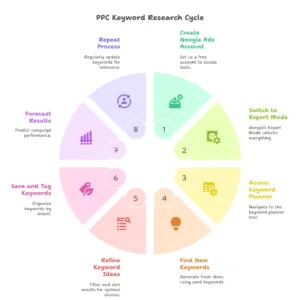
Researching keywords for PPC Services is part science, part detective work. You’re essentially figuring out what your ideal customers are typing into Google when they want what you offer.
There are multiple tools available for keyword research, and here we will focus on Google Keyword Planner.
Step-by-Step Process
- Create Your Google Ads Account: You’ll need a free Google Ads account to access Keyword Planner. Even if you don’t run ads immediately, it’s worth having.
- Switch to Expert Mode: Google defaults to “Smart Mode” for beginners, but Expert Mode gives you the full toolkit, including Keyword Planner.
- Access Keyword Planner: Click on “Tools & Settings” in the top menu, then find “Keyword Planner” under the Planning section.
- Start Finding Keywords:
- Choose “Discover new keywords” to get fresh ideas.
- Enter seed keywords (broad phrases related to your product/service) or your website URL.
- For example, if you sell pet grooming services, start with “dog grooming,” “cat grooming,” and “pet spa.”
- Refine Your Keyword Ideas:
- Filter results by location, language, and search network.
- Sort by average monthly searches, competition level, or CPC to find the sweet spot between demand and cost.
- Save Your Keywords and Test Results:
- Save promising keywords into a list or spreadsheet.
- Tag them by intent (informational, commercial, transactional) so you can group them later.
- Keep an Eye on Your Forecast Results:
- Forecasting shows how many clicks, impressions, and conversions you could get for a set budget.
- Use this to predict ROI before spending.
- Rinse and Repeat:
- Keyword trends shift with seasons, news events, and industry changes.
- Revisit Keyword Planner monthly to keep your campaigns fresh.
Best PPC Keyword Research Tools
While Google Keyword Planner is the go-to for many advertisers, it’s far from the only option. Each tool brings unique features that can give your PPC Services an edge.
1. Google Keyword Planner (Free)
- Directly tied to Google Ads data.
- Great for search volume, competition level, and CPC estimates.
- Best starting point for beginners.
2. SEMrush (Paid, with Free Trial)
- Comprehensive keyword suggestions and competitor analysis.
- Shows which keywords competitors are bidding on.
- Includes ad history to see what’s worked for others.
3. Ahrefs (Paid)
- Known for SEO but excellent for PPC too.
- Offers keyword difficulty scores, click potential, and related queries.
- Ideal for finding long-tail keywords.
4. Keywords Everywhere (Paid Browser Extension)
- Displays keyword volume, CPC, and competition right inside your browser.
- Works on Google, YouTube, Amazon, and more.
5. SpyFu (Paid)
- Specializes in competitor research.
- See every keyword your competitors bid on, how much they spend, and what ad copy they use.
Keyword Research Tips
Even the best tools won’t help if you don’t use them strategically. Here are proven PPC Keyword Research tips to make your campaigns more profitable:
- Start with Understanding Search Intent: Before bidding, know whether a keyword is informational (“how to repair a bike”) or transactional (“buy mountain bike near me”).
- Focus on Long-Tail Keywords for Higher Conversions: Longer, specific phrases often have lower search volume but higher intent and less competition.
- Research Competitor Keywords: Tools like SEMrush and SpyFu let you see exactly what’s driving traffic for your rivals.
- Organize Keywords by Campaign Goals or Services: Grouping keeps your ad copy relevant and boosts Quality Scores.
- Expand Your Keyword List with a Research Tool: Don’t settle for your initial ideas; keep finding new keywords that could outperform your current set.
- Use Keyword Research Tools Like SEMrush or Google Planner: They provide the hard data you need to make informed bidding decisions.
- Test Keyword Variations with A/B Campaigns: Changing one word in a phrase can sometimes double click-through rates. This makes A/B Testing important.
- Don’t forget to Identify Negative Keywords: Example: If you sell premium products, you might exclude “free” or “cheap” to avoid irrelevant clicks.
- Monitor Keyword Performance Regularly: The market changes. Keywords that work today may underperform next month. So maintaining a PPC report comes in handy.
Can I Outsource My Keyword Research Campaign?
Yes, outsourcing PPC Keyword research can be a smart move, especially when you understand the benefits of hiring a PPC agency. Experienced agencies have access to advanced tools and insights, ensuring your campaigns are based on precise, high-converting keywords. A well-rounded PPC service includes not just keyword research, but also ad creation, bid management, and performance optimization to maximize your ROI.
Conclusion
PPC Keyword Research isn’t just a one-time task; it’s an ongoing process that drives the success of all your PPC Services. The more effort you put into understanding your audience’s search behavior, the more relevant, cost-effective, and profitable your campaigns will be.
